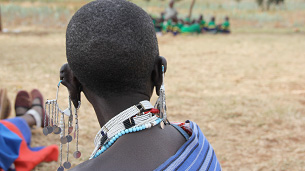
We have spent two years working with a number of communities off the beaten track to identify what they can offer to tourists in and around their villages. And what they need to build or create for tourists to enjoy their stay - campsites, hikes, cultural experiences, transport and food.
We are very proud to offer our own UNIQUE and GENUINE Massai Cultural Tours.
Select and Book your tour here: Itineraries and Bookings
OR for a more hands on experience, come and volunteer in our projects in Northern Tanzania.
Look for more information here: volunteer
Maasai Culture
The Maasai are a relatively small population of people in Kenya and Northern Tanzania (around 500,000 - 800,000, accurate figures are hard to come by) who traditionally live a nomadic pastoralist lifestyle in harmony with the African environment. Over time, in spite of adversity and difficult change, we have maintained our livelihood and social structures which are based around the management of livestock.


First and foremost our culture is bonded through the value of “enkanyet”, or respect. This is respect for yourself, respect for others, respect for your elders and respect for the Earth. Traditionally, we believe that Nkai (our Mother God) provided livestock for Maasai. We start taking care of livestock from a very young age and cattle in particular hold a special place in our hearts and spirituality. Our livestock practices are harmonious with the environment and we have a deep respect for wildlife and the Earth.
The Maasai are an Indigenous minority culture – we have this status because we have been marginalized through colonization and government policies, particularly through the loss of land and ongoing lack of acceptance for our culture and beliefs. We have stayed resilient over this time, continuing to follow and maintain our traditions, but this resilience is decaying due to rapid and uncontrollable barriers we have faced, especially over the last 20 years. The combined forces of global warming, land grabbing and modernization is resulting in deep cracks in our traditional livelihoods and communities. Drought has taken over much of the land we have left, and our capacity to maintain livestock, and therefore eat, has diminished.
Thousands of years of specialization in livestock pastoralism means we have had no need for formal education or to find alternative livelihoods. Our villages are remote with limited access to schools and other essential services. Without livestock or education, how can Maasai make a living? This question is a cause of anxiety for many Maasai, young and old. If we hold on to our traditional lifestyle and livelihoods too strongly, will we survive? If we change our ways, what will happen to our culture and identity?
To find out more about Maasai and the issues confronting our communities, please email us, or visit these links:
Our Approach to Developing Cultural Tourism
For Future Warriors Project the role of economic benefits for communities must always be central to successful conservation models. If communities not only receive greater benefits from cultural tourism, but also actually own and manage tourism campsite and products and, additionally, enter into clear and transparent agreements with responsible tourism and hunting companies, then their livelihoods will be strengthened and complementary goal of wildlife conservation.
Future Warriors Project also realises that cultural tourism can be an extremely fickle business due to global concerns and other factors. Tourism alone can only sustain a small number of villages FWP looks to its partners, and stakeholders, for the development of other enterprises, such as livestock products, local honey, and carbon credit schemes.
